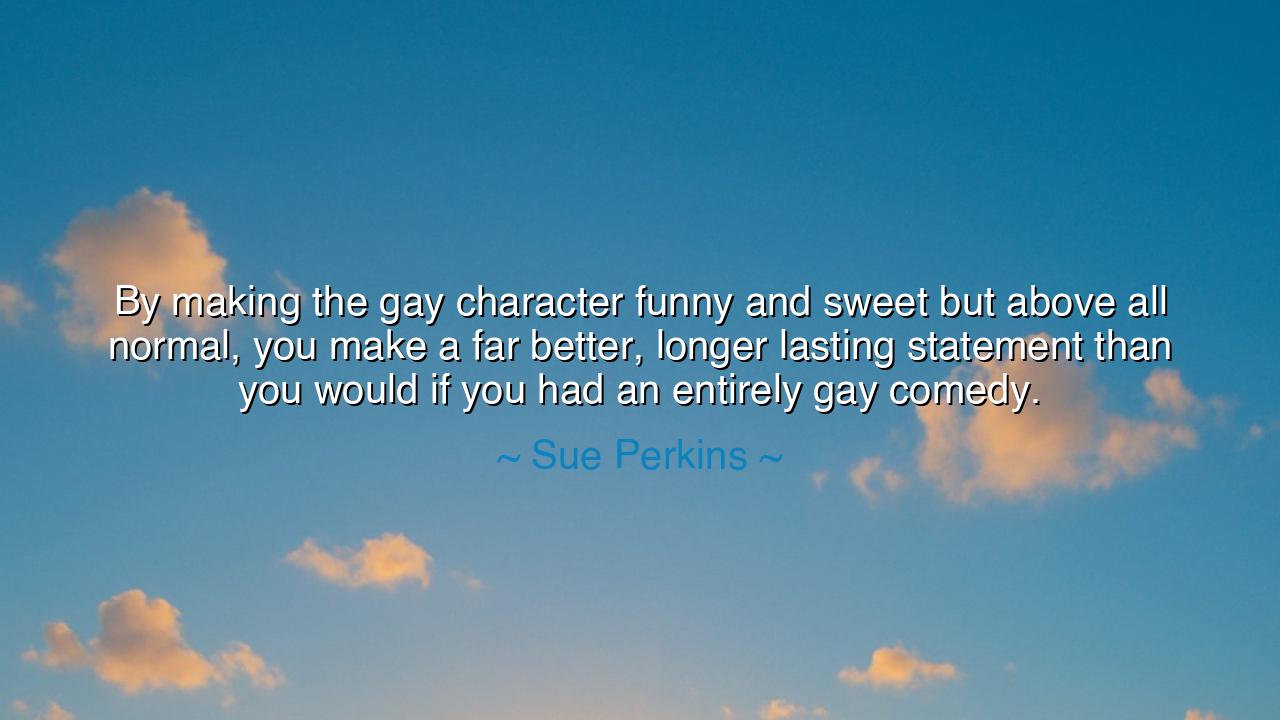
By making the gay character funny and sweet but above all normal
By making the gay character funny and sweet but above all normal, you make a far better, longer lasting statement than you would if you had an entirely gay comedy.






The words, “By making the gay character funny and sweet but above all normal, you make a far better, longer lasting statement than you would if you had an entirely gay comedy,” come from Sue Perkins, the British comedian, writer, and presenter known not only for her wit but for her courage to speak truth through humor. Beneath her gentle tone lies a message of profound cultural insight. In this single reflection, Perkins reveals a truth about the power of representation, the quiet strength of normalcy, and the art of changing hearts not by force, but by familiarity. Her words are a lesson in compassion and subtlety: that acceptance is built not through shouting one’s difference, but by revealing one’s humanity.
To the ancients, truth was most powerful when veiled in story. They knew that the heart of the listener could be reached not through argument, but through empathy. Perkins, in the same spirit, speaks of a way to teach without preaching. By portraying a gay character as “funny and sweet but above all normal,” she reminds us that the greatest revolution begins in the ordinary. When people see themselves reflected in another—laughing, loving, struggling—they forget to divide the world into “us” and “them.” Humor, kindness, and normalcy become bridges over centuries of fear. In this, her words echo the wisdom of ancient dramatists like Aristophanes, who used comedy to hold a mirror to society and soften hearts toward truths they might otherwise resist.
Perkins’ insight was born from her own journey as a comedian and a woman navigating a world that often demanded difference to be either exaggerated or hidden. When she first appeared on British television, her sexuality was not the headline—it was simply part of who she was. Through shows like The Great British Bake Off, she demonstrated that visibility need not always come cloaked in defiance; it can live in authenticity. She understood that laughter, when guided by love, is the most persuasive teacher of tolerance. A character, or a person, who is both real and relatable makes the extraordinary seem ordinary—and that is the essence of acceptance.
Consider the story of Ellen DeGeneres, another pioneer who brought this truth to life. When Ellen came out in 1997, it was through her sitcom character—an ordinary woman who happened to be gay. The world was shaken not because she made a spectacle, but because she made it normal. She laughed, she cried, she loved, she erred—just as anyone else might. Over time, this simple act of living truthfully changed the course of popular culture. The laughter she inspired did more to dissolve prejudice than anger ever could. Sue Perkins’ words capture this same philosophy: that gentle realism, not exaggeration, is what transforms societies.
In her quote, there is also an understanding of artistic restraint—the wisdom to know that power does not always come from declaration, but from demonstration. To fill a story entirely with one perspective may bring awareness, but to weave that perspective naturally into the larger human story brings understanding. The ancients would have called this the golden mean—the balance between too little and too much. By showing the gay character as “sweet, funny, and normal,” Perkins calls for harmony: for truth to be present, but never forced. She teaches that acceptance blossoms when difference is woven into the fabric of shared humanity, rather than displayed as a separate banner.
Her words also reveal the heart of the comedian as philosopher. Comedy, at its highest form, is not cruelty—it is compassion in disguise. It allows us to face what is uncomfortable and laugh, not at others, but at our own narrowness. In Perkins’ view, comedy that includes gay characters as part of the normal human tapestry achieves what lectures cannot: it softens the soul through joy. It creates understanding through shared laughter, not confrontation. This is how culture changes—not by decree, but by familiarity, by the gradual recognition that we all laugh at the same jokes and bleed from the same wounds.
So, my child, learn from this wisdom: seek to humanize, not to separate. Whether through art, conversation, or everyday kindness, show the world that what divides us is small compared to what binds us. When you tell stories—your own or others’—let them be honest, but let them also be filled with light. Laughter, when born of empathy, is a divine force; it melts fear faster than flame. Be like Sue Perkins—use your humor not to mock, but to reveal the dignity that lives within every soul.
And remember this eternal truth: normalcy is the most radical act of all. For when those once seen as “different” are simply seen as human, the walls that separate crumble quietly, and in their place grows understanding. The wise do not shout for acceptance; they live it, laugh it, and embody it. Thus, in the simple portrayal of a “funny, sweet, normal” character lies the quiet triumph of civilization—the moment when love, not identity, becomes the center of the story.






AAdministratorAdministrator
Welcome, honored guests. Please leave a comment, we will respond soon